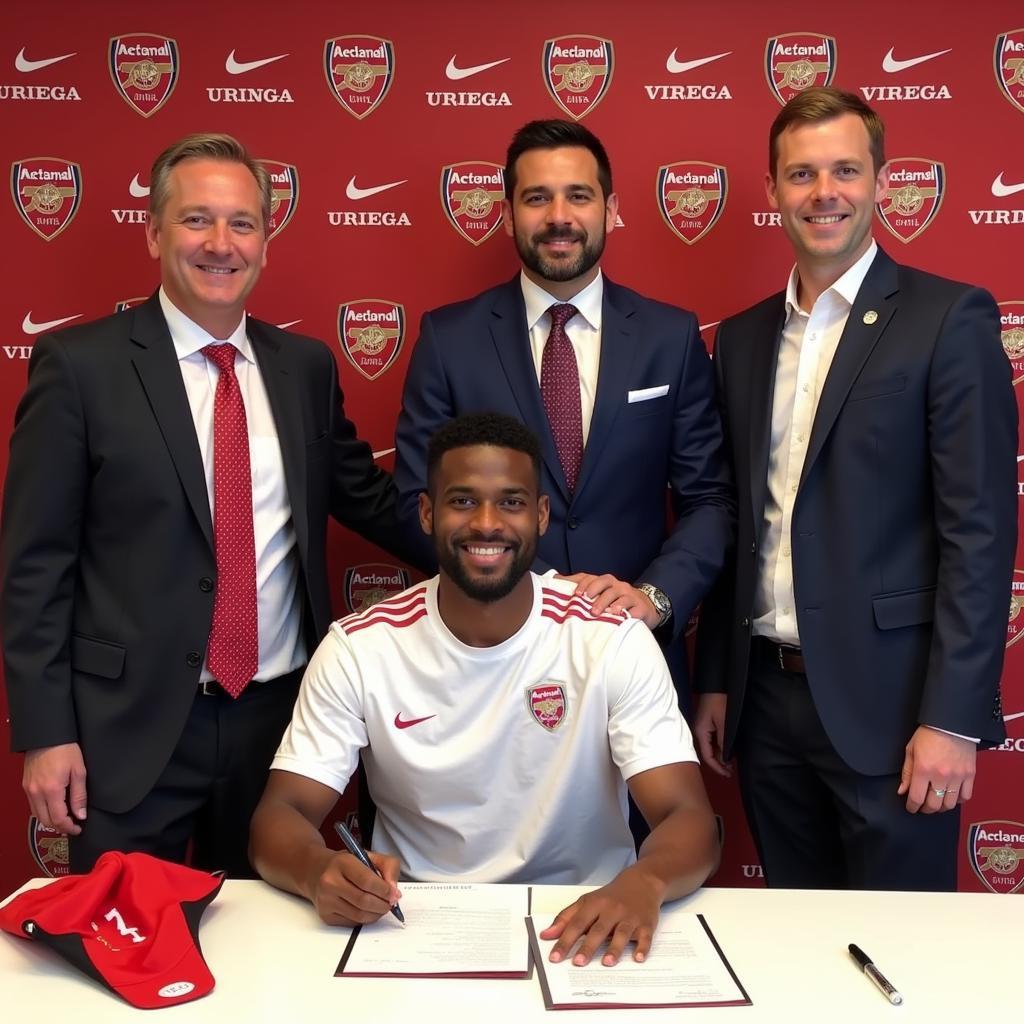Decoding Football Transfers: Understanding Player Contract Agreements
October 10, 2024The world of professional football is filled with exhilarating goals, breathtaking skills, and passionate fans. But behind the scenes lies a complex web of negotiations and contracts that govern player transfers. These agreements, often referred to as “player contract agreements,” dictate the movement of athletes between clubs and shape the landscape of the beautiful game.
What Exactly is a Player Contract Agreement?
A player contract agreement is a legally binding document that outlines the terms and conditions under which a professional footballer is employed by a club. It covers a wide range of aspects, from the player’s salary and bonuses to the duration of their employment and conditions for termination. This comprehensive agreement serves as the foundation for the relationship between the player and the club.
Key Components of a Player Contract Agreement
Player contract agreements are meticulously crafted documents, with every clause carrying significant weight. Here are some of the key components typically found within these agreements:
-
Duration of Contract: This specifies the length of time the player is committed to the club.
-
Salary and Bonuses: This outlines the player’s guaranteed income, including their annual salary, signing bonus, and performance-based incentives.
-
Image Rights: This clause defines how the player’s image can be used for commercial purposes, such as endorsements and merchandise.
-
Transfer Clause: This crucial section outlines the conditions under which a player can be transferred to another club, including potential transfer fees and buy-out clauses.
-
Termination Clause: This specifies the grounds on which either the player or the club can terminate the contract prematurely, such as breach of contract or disciplinary issues.
-
Confidentiality Agreement: This clause ensures that sensitive information regarding the player, the club, and the contract details remains confidential.
 Football Player Signing Contract
Football Player Signing Contract
The Role of Agents in Player Contract Agreements
Football agents play a pivotal role in negotiating and securing the best possible terms for their clients. They are responsible for:
-
Negotiating with Clubs: Agents engage in intricate negotiations with clubs to secure favorable contract terms for their clients.
-
Facilitating Transfers: Agents act as intermediaries between clubs, facilitating the transfer of players and ensuring a smooth transition.
-
Managing Player Interests: Agents prioritize their clients’ interests, offering guidance and support throughout their careers.
The Impact of Player Contract Agreements on Football
Player contract agreements have a profound impact on the sport, shaping the competitive balance and financial stability of clubs.
-
Financial Implications: Transfer fees generated from player transfers can provide clubs with significant financial resources, impacting their ability to invest in infrastructure, youth development, and other key areas.
-
Competitive Balance: The movement of top players between clubs can influence the competitive balance within leagues, potentially creating dynasties or disrupting existing power structures.
-
Player Power Dynamics: Contract negotiations and transfers highlight the power dynamics between players and clubs, showcasing the influence of top talents in shaping their careers.
The Future of Player Contract Agreements
As the football industry continues to evolve, so too will player contract agreements. The rise of data analytics, new technologies, and evolving legal frameworks will likely shape the future of these agreements, potentially leading to more complex and nuanced terms.
 Agents and Club Representatives in Negotiations
Agents and Club Representatives in Negotiations
Conclusion
Player contract agreements are the backbone of professional football, governing the movement of players and shaping the landscape of the sport. Understanding the intricacies of these agreements is essential for anyone seeking to navigate the world of football transfers. As the game continues to evolve, so too will the contracts that bind players and clubs, ensuring that the beautiful game remains a captivating spectacle both on and off the pitch.
FAQ
Q1: What is the average length of a professional football contract?
A1: The average length of a professional football contract typically ranges from two to four years.
Q2: What is a buy-out clause?
A2: A buy-out clause is a predetermined amount stipulated in a player’s contract that allows another club to purchase the player’s contract outright, regardless of the selling club’s wishes.
Q3: Can players terminate their contracts early?
A3: Players can terminate their contracts early under specific circumstances, such as a breach of contract by the club or if a mutually agreed-upon release clause is activated.
Q4: What role does FIFA play in player transfers?
A4: FIFA, the international governing body of football, regulates player transfers through its Regulations on the Status and Transfer of Players (RSTP), ensuring fairness and transparency in the process.
Q5: What is the role of solidarity payments in player transfers?
A5: Solidarity payments are compensation mechanisms designed to benefit clubs that have contributed to a player’s training and development, ensuring that they receive a share of the transfer fee when the player is sold.
For further assistance or inquiries regarding player contract agreements, please contact:
Phone: +84 0396443476
Email: [email protected]
Address: 23 Thang 3 Street, Dak Nia, Gia Nghia, Dak Nong, Vietnam.
Our dedicated customer support team is available 24/7 to address your needs.